Who will succeed Raisi and what it means for the region?
The sudden death of a leader will shake any country, but the crash that killed President Ebrahim Raisi comes at a particularly precarious moment for Iran and the Middle East as a whole.
The Islamic Republic is a regional giant that can ill afford a wobble at the top.
Abroad, it is engaged in a shadow war with Israel that has come terrifyingly close to spiraling into an open regional conflict. At home, it is grappling with a long-running economic crisis that’s been joined by social turmoil, as brutal protest crackdowns have caused a widening chasm between the ultraconservative religious elite and the more liberal youth.
Raisi, 63, was seen by many as a pliant figurehead, chosen for his loyalty to Ayatollah Ali Khamenei, Iran’s aging supreme leader. While this may not change any immediate policies — foreign or domestic — many observers believed him to be a front-runner to replace Khamenei, 85, and his sudden death could upend the battle to helm the theocratic regime as it confronts these challenges.
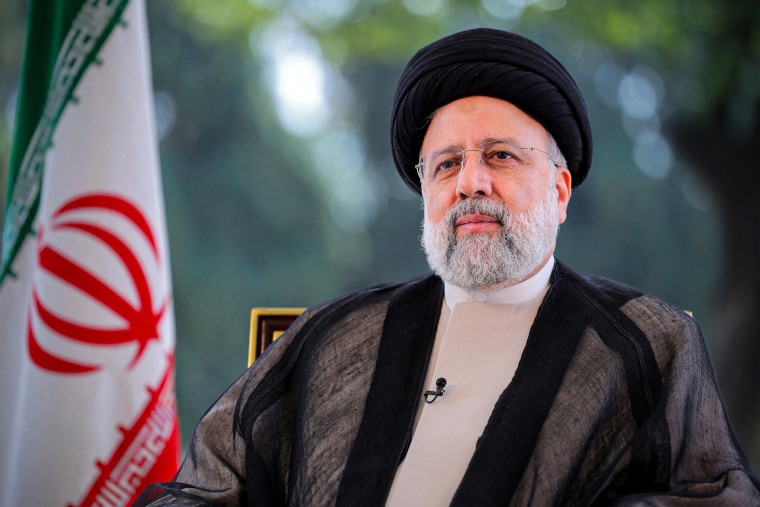
“There is a big void with Raisi gone, not just in terms of presidential candidates but also, even more importantly, in terms of succession to the supreme leader,” Aniseh Bassiri Tabrizi, an Abu Dhabi-based senior analyst at the security consultancy Control Risks, told NBC News.Raisi’s shocking death comes at a time of vulnerability for Iran, even as it forges deeper ties with Russia and China.
More generally, it could add an “increased perception of vulnerability” of Iran in Western eyes, Tabrizi said.
“That will affect their negotiating position,” she added, whether that’s “on nuclear issues or, generally speaking, on negotiations with the West.”
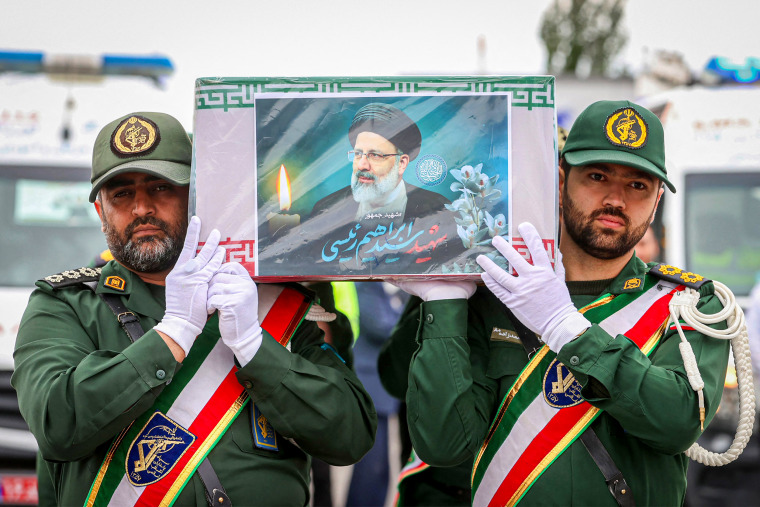
Tehran has accelerated its nuclear program since the United States withdrew from a landmark agreement capping its activities and has now pushed far beyond the restrictions imposed in that deal, enriching uranium close to the levels needed to build nuclear weapons, according to the International Atomic Energy Agency.Meanwhile, it is supporting a number of proxy forces fighting Israel, and in some cases American forces, across the region: from Hamas in Gaza, Hezbollah in Lebanon, the Houthis in Yemen, and fighters in Iraq and Syria.
The situation escalated last month after a suspected Israeli bombing of a consular building in Damascus, Syria, killed two Iranian generals. Iran’s unprecedented direct response of 300 missiles and drones fired at Israel brought the rivals closer to a wider war that neither appeared to want.
Raisi “was not a strong driving force of any particular line on Iranian foreign policy, and as a result, his absence is not going to have an impact on that,” said Trita Parsi, executive vice president of the Quincy Institute for Responsible Statecraft, a Washington-based think tank.
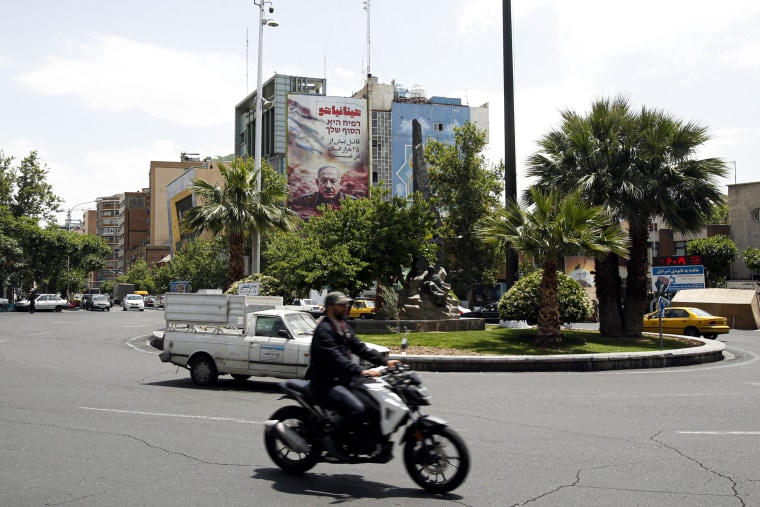
However, his death “is going to create some problems for the regime internally,” according to Parsi, not only “intensifying the rivalry over who will take over the supreme leadership,” but also possibly weakening Iran’s attempts to limit attacks by its proxy militias on American forces.If Iran’s sudden succession quandary causes “some sort of a paralysis, even briefly, it could lead to a scenario in which Iran’s control over these militias is weakened,” he said. “And they may actually begin anew their attacks on U.S. troops and bases.”
It’s clear Iran wants to convey an air of stability and strength.
Khamenei enacted Article 131 of the Constitution, giving Vice President Mohammad Mokhber power and mandating elections within 50 days, while launching five days of mourning featuring public funeral processions in major cities that began Tuesday.
“The Iranians will certainly try to present this as nothing changing,” said Michael Stephens, a senior fellow at the Foreign Policy Research Institute, a Philadelphia-based think tank. “Mokhber isn’t really well known, so they can paint any image onto him that they like, essentially.”
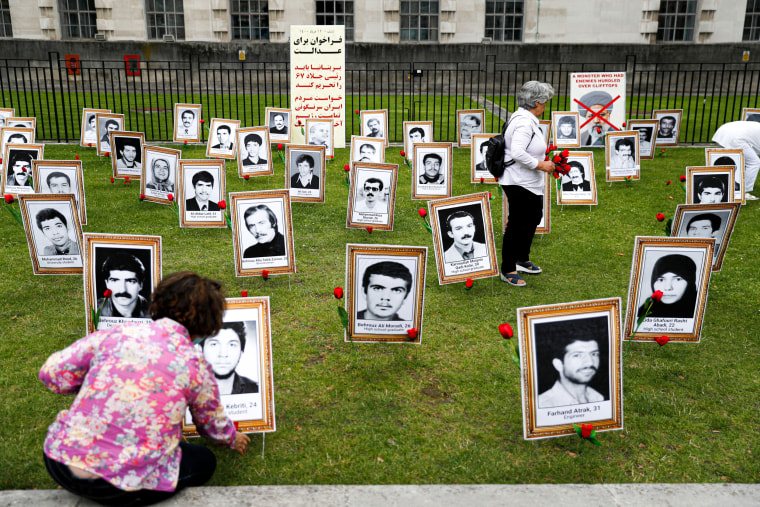
It’s unclear who Raisi’s successor might be, owing to the opaque nature of Iran’s political system. Hard-liners have assumed dominance of all major facets of Iranian power, and the clerical elite tightly controls who is allowed to run in its elections — disbarring moderates at recent ballots in March.Keen Iran-watchers expect Mohsen Rezaee, former head of the powerful Islamic Revolutionary Guard Corps, and former Central Bank governor Abdolnaser Hemmati to stand again as they did in 2021.
Mohammad Bagher Ghalibaf, current speaker of the Iranian Parliament, “is the most prepared candidate,” according to the London-based diaspora news website IranWire. Meanwhile, “Mokhber will certainly throw his hat in,” Gregory Brew, an analyst at the New York consultancy Eurasia Group, wrote on X.
A new vote “will bring some dilemmas for the regime’s top leaders: How open a field will they allow?” Rob Macaire, former British ambassador to Iran, wrote in an Atlantic Council briefing. “Would they prefer a cleric, who might be seen as a potential contender to take over from Khamenei in due course, or a technocrat?”
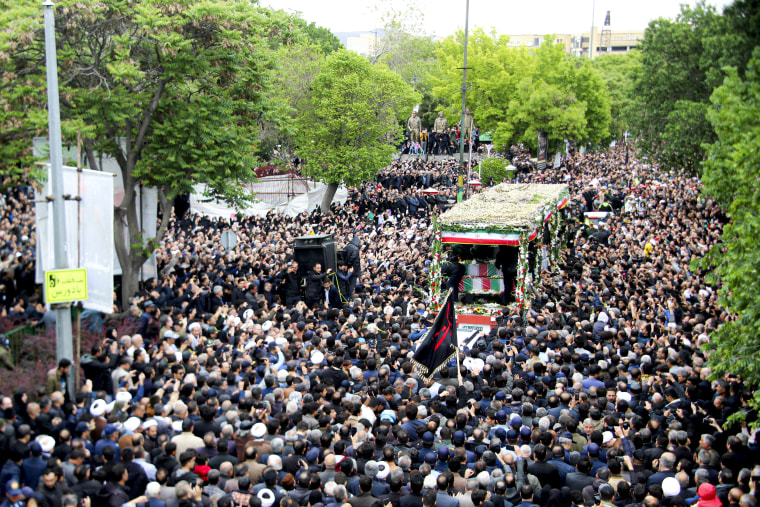
For many Iranians, Raisi was a hated figure, owing to his role overseeing mass executions in the 1980s — which earned him the nickname the “Butcher of Tehran” — and his more recent, brutal crackdown on protesters demonstrating against Iran’s conservative clothing restrictions for women.Turnout for the March elections was just 41%, the lowest in modern history. And public mourning for Raisi has been far more muted than for other officials, according to Reuters reports from the region, with many shops staying open. Meanwhile, there were scenes of celebration among the Iranian diaspora in London and elsewhere.
Maryam Rajavi, an Iranian dissident politician exiled in Paris, issued a statement calling the shock death “a monumental and irreparable strategic blow” for Khamenei that would “trigger a series of repercussions and crises within theocratic tyranny, which will spur rebellious youths into action.”
But any hopes that Raisi’s death may open the way for a less hard-line supreme leader will very likely be disappointed, Parsi at the Quincy Institute said.
“The main candidates right now, as at least the ones that have publicly spoken, are not necessarily less hawkish than Raisi,” he said. “On the contrary, many of them are considered to be more so.”





